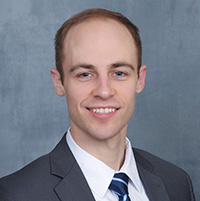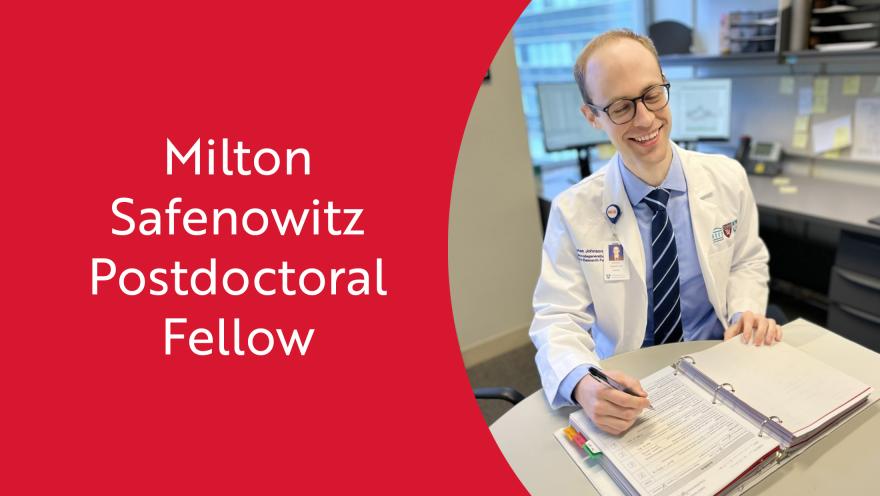It’s going to take all of us working together, doing whatever it takes, to make ALS a livable disease and ultimately find a cure. That includes researchers like our 2021 Milton Safenowitz Postdoctoral Fellowship Program recipients who are playing an important role in helping to make this happen.
The Milton Safenowitz Postdoctoral Fellowship Program continues to support young scientists and is the only program of its kind specifically funding early ALS postdoctoral fellows eagerly searching for effective treatments and a cure. Founded in memory of Mr. Safenowitz by the Safenowitz family through The ALS Association Greater New York Chapter, this unique program encourages young scientists to enter and, importantly, to remain working in the ALS field.
After completing the program, more than 75% of the postdoctoral fellows go on to start their own labs to continue studying ALS and mentor other young ALS researchers. “The Safenowitz Program is key to developing the pipeline of ALS researchers who year in and year out reinvigorate the field and help push the quest for new treatments and cures for ALS forward,” said Dr. Paul Larkin, director of research at The ALS Association.
This year, we were proud to support four new postdoctoral fellows from a highly competitive applicant pool. We are excited to highlight their dedication and unique contributions to ALS research, as well as their interests outside of the lab.

We talked with Dr. Stephen Johnson, postdoctoral fellow from Massachusetts General Hospital, to learn more about his research focused on ways to accelerate discovery of efficacious therapeutics through identification and validation of novel outcome measures using readily available technology.
Can you briefly describe your academic background?
I became interested in the central nervous system at an early age, taking part in a summer research program as a high school student studying neuroapoptosis (neuronal programmed cell death). As an undergraduate, I studied medical anthropology at Washington University in St. Louis and continued the previous research. I then attended University of Missouri-Columbia School of Medicine for medical school, where I was able to learn about and care for people with ALS. My experiences motivated me to pursue a neurology residency at Mayo Clinic Rochester, followed by a neuromuscular fellowship at Massachusetts General Brigham. These positioned me well to apply for my current fellowship position as an ALS clinical research fellow under the mentorship of James D. Berry, MD.
What are the goals of your funded research project?
We have yet to find a treatment that drastically slows disease progression. This may be partly due to the time, investment, and effort needed to run clinical trials. Another factor may be the way that outcomes are assessed or the outcomes themselves. My research focuses on ways to accelerate discovery of efficacious therapeutics through identification and validation of novel outcome measures using readily available technology (such as personal smartphones). One’s smartphone can allow one to both actively (e.g. remote entry of patient reported outcomes) as well as passively (e.g. using device sensors) participate in clinical trial research. This study involves using one’s personal smartphone and a downloaded research platform/application (app) to collect active and passive data. We want to learn if staff-administered ALSFRS-R (the main outcome measure of ALS clinical trials) is concordant with self-entry (phone) ALSFRS-R along with an alternative functional outcome scale called the ROADS. In addition, we want to examine the correlations of the slopes of functional decline, another important outcome measure. Finally, we want to understand how the active and passive personal smartphone data collection correlates with the above scales. If the active and passively collected data are highly correlated, they could potentially serve as new outcome measures in clinical trials and hasten drug discovery.
How might your work impact the ALS community?
If patient reported outcomes and digital measurements (digital biomarkers) are highly correlated with our current tools to understand ALS functional decline, this paves the way for using digital outcome measures as clinical trial endpoints, which is important in two major ways. The first is that the ability to have repeated measurements at a much higher frequency (and remotely) means more data can be obtained while reducing barriers to trial participation. As a result, trials can be of shorter duration, more inclusive, and require fewer participants per trial to know whether a given treatment works or not. This translates to getting more answers and doing so faster. The second is that outcomes can measure one’s real life lived experience and therefore may be a better reflection of one’s day to day physical function. Together, these signify the potential to hasten drug discovery in a way that is more participant-focused and inclusive.
Why did you decide to study ALS over other diseases?
I chose to study ALS because it profoundly affects one’s physical function and because we lack highly effective therapies to prevent or slow its progression. While there are many diseases that significantly affect one’s quality of life, ALS uniquely results in a loss of physical autonomy, which I view as very important to one’s happiness and wellbeing. I want to do my part to move the field forward knowing that the need to do so is significant, urgent, and that even small wins may make a big difference in patients’ quality of life.
What do you like most about working in the ALS research field?
What I like most is working with the patients. The patients I have had the pleasure to work with have been as inspiring as they are exemplary models of kindness and compassion in the face of a devastating disease. I am honored to have the opportunity to work with this amazing group of people.
Where can people get more details about your research project?
The data is still being collected; however, we will publish results as soon as we can.
It is often said that ALS is one of the most complex diseases to understand. Yet, you go to work every day to tackle the challenges of your research. What gives you hope that there will someday be a world without ALS?
The many basic research laboratories exploring different potential disease mechanisms, the number of upcoming clinical trials, and the successes we’ve had in the treatment of other neuromuscular diseases (such as the single-dose IV drug for spinal muscular atrophy) all give me hope that one day we can prevent, stop, or even reverse ALS.
What do you like to do when you aren’t in the lab?
When not doing research, I like spending time with family and friends, jogging/hiking, and reading for pleasure.
Is there anything else you’d like to add?
I want to sincerely thank The ALS Association and Safenowitz family for their support, the patients and families who entrust us with their care and help us advance our understanding and treatment of ALS, and finally all those (mentors, family, friends) who have supported me along the way.
Stay up to date with the latest ALS research news by subscribing to our monthly newsletter, Research Matters. To learn more about the research we fund, visit als.org HERE.
To continue to follow stories from people in the ALS community and learn more about the disease, subscribe to receive our weekly blogs in your inbox HERE or follow us at als.org/blog.


Comments
As an ALS patient, I am willing to participate in the research being conducted. I am in St. Louis for several days every three months (next schedule visit to the St. Louis U. ALS Center in late October).
Join the conversation. Please comment below.